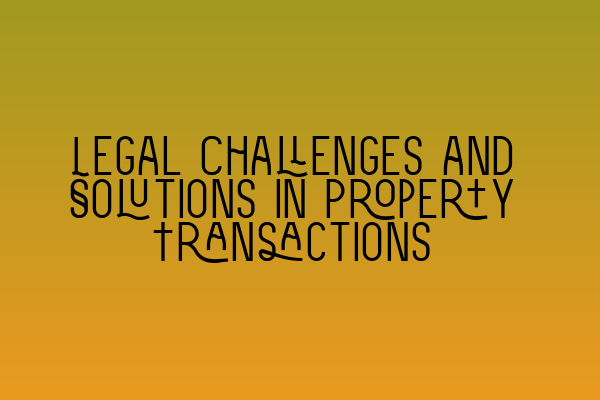Legal Challenges and Solutions in Property Transactions
Property transactions can be complex and fraught with legal challenges. From drafting contracts to navigating regulatory requirements, there are various aspects of property law that require careful attention. In this article, we will explore some common legal challenges faced in property transactions and provide solutions to overcome them.
Understanding Contractual Capacity
One of the key challenges in property transactions is ensuring that all parties involved have the necessary contractual capacity. Understanding the rights and limitations of contractual capacity is crucial to avoid potential disputes.
To learn more about contractual capacity, its rights, and limitations, you can read our related article on Understanding Contractual Capacity: Rights and Limitations.
One solution to this challenge is conducting proper due diligence on all parties involved in the transaction. This includes verifying their legal competence and ensuring that they have the authority to enter into the contract. Seeking legal advice from a solicitor experienced in property law can also help identify any potential issues.
Navigating Regulatory Requirements
Property transactions are subject to various regulatory requirements that can vary depending on the jurisdiction and type of property involved. From planning permissions to environmental regulations, it is essential to understand and comply with these requirements.
For interactive SQE mock tests to test your knowledge on regulatory requirements, you can visit our related article on Interactive SQE Mock Tests for Contract Law: Test Your Knowledge.
To navigate these regulatory challenges, engaging the services of a property law solicitor with expertise in the specific area can be highly beneficial. They can guide you through the process, ensuring compliance with all necessary regulations and helping you obtain the required permits or consents.
Dealing with Title Defects
Title defects can arise in property transactions, jeopardizing the validity or marketability of the property. These defects can include issues related to ownership, encumbrances, or previous fraudulent activities.
If you want expert insights and guidance on property law, you can join our SQE contract law webinars. Check out our related article on Join Our SQE Contract Law Webinars: Expert Insights and Guidance to learn more.
When dealing with title defects, it is crucial to conduct a thorough title search and review. This will help identify any potential issues early on in the transaction process. Working with a knowledgeable solicitor can provide invaluable assistance in resolving these defects and protecting your interests.
Managing Financing and Mortgage Issues
Financing and mortgage issues can also pose challenges in property transactions. From obtaining mortgage approvals to dealing with foreclosure possibilities, it is crucial to navigate these issues effectively to minimize risks and ensure a smooth transaction process.
For a comprehensive understanding of contractual capacity and legal competence in contracting parties, you can read our related article on Contractual Capacity: Understanding Legal Competence in Contracting Parties.
Working closely with a solicitor who specializes in property law can help you secure favorable financing terms and navigate potential mortgage pitfalls. They can guide you through the legal requirements, review mortgage agreements, and ensure compliance with all necessary regulations.
Keeping Up with Contract Law Reforms
Contract law is constantly evolving, with frequent reforms and changes. Staying updated with these changes is crucial to ensure compliance and avoid legal pitfalls in property transactions.
If you want to stay updated on the latest contract law reforms, you can read our related article on Contract Law Reforms: An Analysis of Recent Changes.
To stay ahead of these challenges, it is essential to engage in continuous professional development and stay informed about the latest legal developments. This can be achieved by attending webinars, seminars, and training sessions conducted by legal professionals specializing in property law.
Conclusion
Property transactions come with their fair share of legal challenges, but with the right knowledge and guidance, they can be successfully overcome. By understanding contractual capacity, navigating regulatory requirements, addressing title defects, managing financing and mortgage issues, and staying updated with contract law reforms, you can ensure a smooth and legally sound property transaction.
